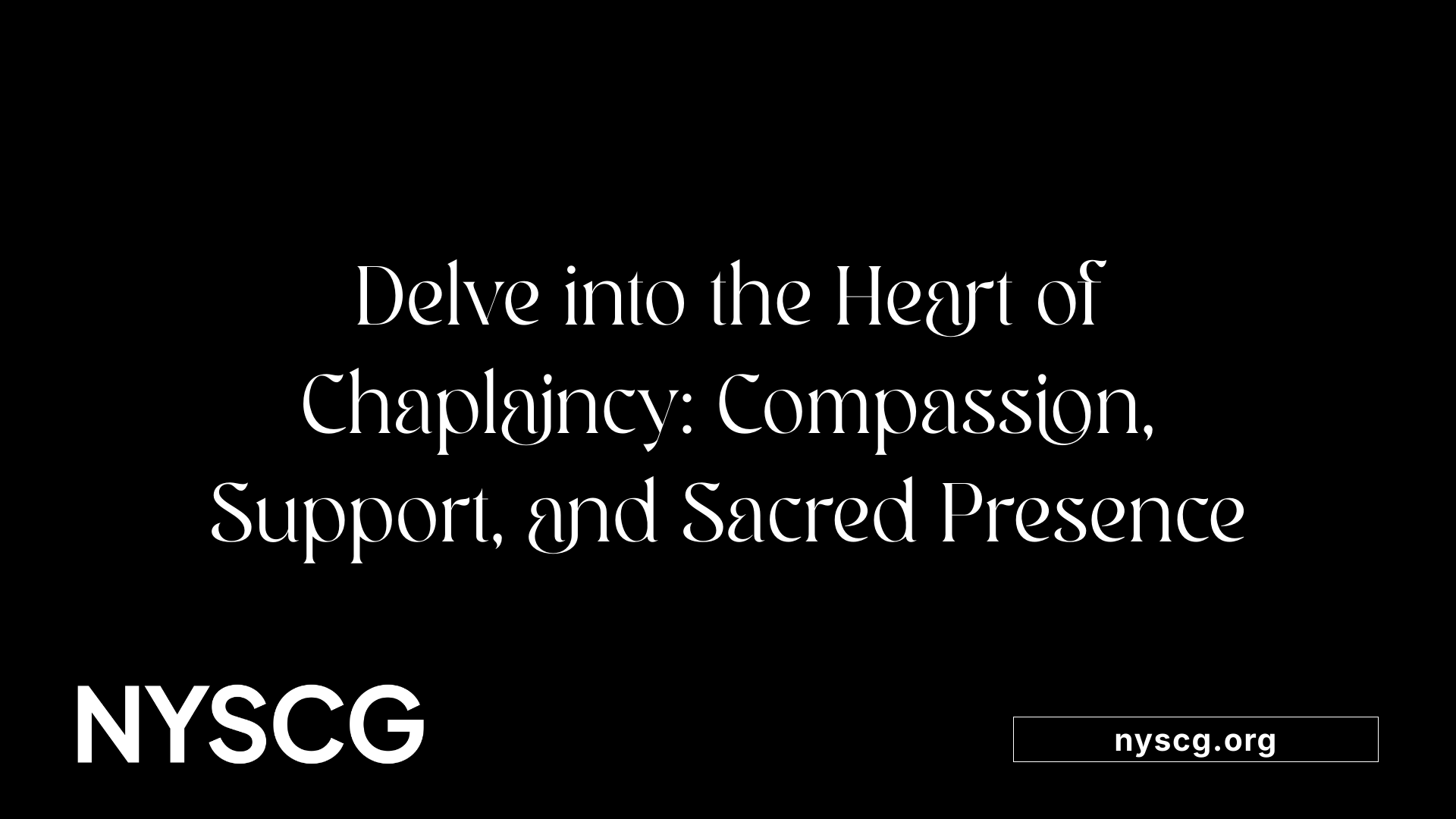How to Start a Chaplain Ministry in Your Local Church


Starting a chaplain ministry within your local church can significantly broaden your community outreach, providing vital spiritual care in secular and community settings. This article offers a comprehensive guide on establishing an effective chaplaincy, covering purpose, roles, qualifications, training, endorsements, and organizational development.

Chaplaincy ministry covers a broad range of spiritual, emotional, and social support services provided in diverse settings such as hospitals, prisons, military environments, schools, and workplaces. Its main goal is to be a comforting presence for individuals facing significant or difficult moments, offering encouragement and Christ-centered care.
Chaplains serve as guides and helpers, leading ceremonies like weddings, funerals, and baptisms, and offering pastoral counseling and spiritual coaching. They are trained to meet people where they are, respecting their unique backgrounds and needs, whether religious or secular.
The core purpose of chaplaincy is to foster trust and provide comfort through authentic presence. This means being fully attentive, empathetic, and respectful, creating a safe space for individuals to process their struggles or celebrate important life events.
An essential aspect of chaplaincy is the recognition of the divine or sacred in everyday life. Chaplains aim to reflect that presence in their interactions, helping people find hope and resilience in challenging situations. By doing so, they support not only spiritual growth but also emotional well-being.
In essence, chaplaincy extends the support and care typically associated with local church ministries into various community settings. It emphasizes compassion, spiritual nurturing, and the promotion of hope, serving as a vital element of community and organizational support systems.

Chaplains serve a crucial function by providing spiritual and emotional support in a variety of organizational settings. This includes hospitals, military bases, correctional facilities, schools, and community centers. Their main role involves offering comfort, guidance, and spiritual care to individuals facing challenging circumstances or crises.
In addition to emotional support, chaplains are often involved in conducting ceremonial duties. They officiate weddings, lead funerals, perform baptisms, and administer sacraments when required. These duties help individuals mark important life events while receiving spiritual reassurance.
Crisis intervention and counseling are also key responsibilities. Chaplains are trained to provide immediate emotional support during crises such as accidents, natural disasters, or personal loss. They assist in managing stress, grief, and trauma, helping individuals and groups process difficult experiences.
Beyond direct care, chaplains actively promote well-being and resilience within their organizations. By fostering a supportive environment, they help reduce anxiety and encourage healing. They work alongside staff and leadership to address cultural and spiritual concerns, contributing to a holistic approach to health and well-being.
Overall, chaplains enhance organizational health by integrating spiritual care into everyday support services. Their presence encourages a compassionate community, offering a sense of hope and comfort that benefits everyone involved.

Becoming a chaplain involves a combination of formal education, specialized training programs, and practical experience. For those just starting out, undergraduate and graduate degrees in theology, pastoral studies, or related fields serve as foundational steps. Many colleges and seminaries offer bachelor’s and master’s programs that prepare students for ministry and chaplaincy roles.
In addition to traditional degree programs, numerous specialized training options are available, including unique programs focused solely on chaplaincy. The Christian Leaders Institute (CLI), for example, offers accessible online courses in biblical principles, pastoral counseling, and communication skills. These courses are designed to prepare individuals for practical ministry in various settings, such as hospitals, military facilities, and community organizations. CLI also provides certifications, credentials, and even a fully accredited bachelor's degree in Chaplaincy through their Leadership Excellence School.
Online courses have expanded opportunities for aspiring chaplains, allowing flexible learning schedules. Organizations like I.F.O.C. provide additional online continuing education in specialized areas such as Healthcare, Church, and School Chaplaincy. These programs often feature affordable options and pathways to formal certification or credentialing, depending on the participant’s goals.
A critical component of chaplain training is Clinical Pastoral Education (CPE). CPE involves supervised practical experience in clinical settings, such as hospitals and prisons. It emphasizes developing skills in pastoral care, crisis intervention, and spiritual assessment. Completing CPE is frequently a requirement for certification and ordination, ensuring that chaplains are well-prepared for the emotional and spiritual challenges they will encounter.
Overall, aspiring chaplains can choose from a mix of academic degrees, online coursework, and CPE programs. These educational pathways prepare individuals to serve effectively in diverse environments, extending spiritual support beyond traditional church settings and into broader community and institutional contexts.

Becoming an endorsed and certified chaplain involves several educational and experiential steps. Initially, candidates must earn a bachelor’s degree from an accredited college or university. Following this, they need to complete a master's degree in Theology, Philosophy, or Psychology, totaling at least 30 semester hours. These educational programs should include coursework that covers chaplaincy competencies.
In addition to academic requirements, candidates must complete 48 to 72 graduate semester hours, which may include interdisciplinary courses targeting spiritual care, counseling, and ethical practices. A critical component of certification is completing four units of Clinical Pastoral Education (CPE), providing hands-on experience in providing spiritual care in real-world settings.
Candidates are also required to demonstrate current endorsement or recognition from their faith group, a validation that their spiritual aptitude is recognized by their ecclesiastical authority. Endorsement must be approved by bodies like the Department of Defense or similar certifying organizations.
Once educational and endorsement prerequisites are fulfilled, applicants need to log at least 2,000 hours of chaplaincy service, which showcases their practical experience and competence in ministry roles.
The application process includes submitting comprehensive documentation, including transcripts, endorsement letters, and a personal statement. An interview is typically part of the review process, where applicants showcase their understanding of chaplaincy responsibilities.
The final step involves a committee review, where a panel assesses qualifications before granting certification. This process is ratified by organizations such as the Board of Certification in Chaplaincy Inc. (BCCI). The complete certification journey generally takes between three months and up to a year, depending on individual circumstances and processing times.
This multi-step process ensures that chaplains are well-prepared, professionally competent, and recognized by their faith communities and certifying bodies, enabling them to serve effectively in diverse settings such as hospitals, military, and community organizations.

Starting a chaplaincy program involves careful planning and strategic development. The first step is to assess the spiritual and emotional needs of the community or organization. This helps in defining the scope and focus of the ministry.
Once needs are identified, organizations should seek guidance from experienced chaplains or established chaplaincy organizations such as the Association of Professional Chaplains (APC) or the National Association of Catholic Chaplains (NACC). These groups provide valuable resources, training standards, and accreditation guidance.
Developing a clear plan is essential. This includes recruiting qualified individuals who preferably have a background in theological studies, such as a Master of Divinity, and practical training through Clinical Pastoral Education (CPE). Such qualifications ensure the chaplains are prepared to handle diverse situations.
Endorsements or ordinations may be required depending on the sector—for example, hospitals or military organizations may have specific credentialing criteria. Establishing policies aligned with professional standards and ethical guidelines safeguards the integrity of the ministry.
Continuous evaluation fosters growth. Organizations should build strong relationships with recognized religious bodies, support ongoing education for chaplains, and pursue accreditation from reputable organizations. These steps contribute to a sustainable, effective chaplaincy that addresses the spiritual needs of the community.
By combining strategic planning, qualified staffing, and adherence to ethical standards, organizations can successfully launch and grow a meaningful chaplaincy ministry that offers compassionate, Christ-centered care in various settings.
Chaplaincy offers a broad landscape of roles both within religious institutions and in secular environments. Professional chaplains serve in hospitals, prisons, military forces, universities, mental health facilities, and corporate structures. These positions typically require relevant training such as Clinical Pastoral Education (CPE) and advanced degrees like a master's in divinity, theology, or related fields.
In addition to conventional roles, many chaplains find opportunities in religious leadership, spiritual education, and writing. There are also vital roles in social justice, community development, and outreach initiatives, allowing chaplains to extend their ministries beyond traditional settings.
As populations age, chaplains are increasingly serving in senior living communities, providing essential spiritual, emotional, and even psychological support. For those interested in broader faith-based engagement, careers in media, publishing, mission work, and international development are also accessible pathways.
Chaplains can serve either on a volunteer basis or as paid professionals. Volunteer chaplains often serve in civic roles, law enforcement, emergency services, and community organizations, often with ecclesiastical approval. Paid roles tend to be in hospitals, military services, correctional facilities, and educational institutions.
While volunteer chaplaincy can involve significant responsibilities, they typically do not require formal compensation, though room and board may be provided during deployments. Paid chaplains often undergo rigorous certification processes and are employed under formal arrangements with their organizations.
One of the strengths of chaplaincy is its cross-denominational nature. Many organizations, including military, hospitals, and law enforcement, support chaplains from various Christian denominations and sometimes from other faith backgrounds. The goal is to provide inclusive spiritual care that respects diverse beliefs.
Additionally, secular and non-religious chaplaincy roles are emerging, especially in workplaces and community settings, focusing on holistic support, mental health, and moral guidance without religious affiliation.
Beyond traditional roles, chaplains can serve in specialized areas such as disaster response, where they provide crisis intervention, emotional support, and spiritual care during emergencies. Some participate in training programs like the Christian Leaders Institute or military chaplain candidate programs, which can lead to formal certifications.
Furthermore, chaplaincy can be a platform for involvement in advocacy, social justice work, or global missions. It also offers opportunities for ongoing education, developing leadership skills, and building networks across faith communities and secular organizations. Each pathway enriches the ministry, allowing individuals to serve effectively in multiple contexts, fulfilling their spiritual callings with wide-reaching impact.
Starting a chaplain ministry in your local church opens a transformative pathway to serve beyond the traditional congregation—reaching into community, civic, and secular sectors with compassion and spiritual guidance. By understanding the scope, acquiring appropriate training, securing endorsements, and developing organizational policies, your church can become a vital hub for spiritual care and community support. Embracing the diverse opportunities and pathways in chaplaincy not only enriches your church’s ministry but also extends Christian compassion into the wider world, reflecting the essence of Christ’s love in practical, impactful ways.
All you need is the will to make the world a better place.
New York State chaplain group inc. is a tax deductible organization with a federal tax Id number 92-383-4921